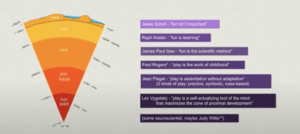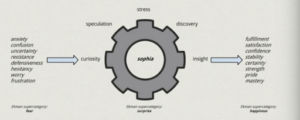Let’s begin with… fun is learning. But what is fun anyways? Fun has been defined as:

Lesson: Kids are smarter than you
- “SimCity is pretty fun, but we aren’t learning anything” — you would think that by the children having fun, they would learn, but its not the case: they came in with a particular expectation/mindset for learning!
- “Fun is learning” is the beginning, but not the end!
- 7 universal emotions across all cultures: disgust, contempt, sadness, happiness, fear, anger, surprise -> where is fun? No one emotion corresponds to it
- Takeaway: fun/learning is not one emotion, but a sequence/process!
SOPHIA: The game-learn emotion!
- Fear -> surprise -> happiness

- Example: Think about the gut microbiome (ew!) – but it can help us solve a lot of problems (woah!)
- Some games exhibit more SOPHIA than others
- Meaningful Games – Make the jump between game model and world model (think Candy Crush vs. Journey), connects to the real world. We should evaluate the effect we are having on the player
- Alongside the Sophia emotion, we can categorize games by the dominant/core emotion they invoke! Though, Sophia is in all of these

- In designing for SOPHIA, you must identify the FEAR created by absence of skill, then bring up players into the HAPPINESS of mastery!
- Sophia is what drives the core emotion
- Example: God of War drives a feeling of power vs. Animal Crossing driving a feeling of togetherness
Mechanics and Emotion
-
- Each action in a game creates an emotion: the emotion emerges from the connections between individual mechanics in a game!
- First, you need to find the emotion: without emotion, argumentation is confusing and unmemorable. Ultimately, we want to always alleviate suffering.
- What progression of emotions would make you feel like you had mastery of this skill?
- Articulate the why – reverse the painful emotions caused by the absence of a particular skill!
So what? SOPHIA can help you determine the problems with your game:
- Lack of clarity of core emotion? Do you have a core emotion?
- Not enough surprise preceding satisfaction?
- Lack of tension because the fear isn’t illuminated?
Personal Questions
- How should we determine which set of emotional progression best suits our desired learning goals? How do you evaluate a successful emotional progression?
- How can we design our mechanics around eliciting particular emotions / creating a particular emotional progression? How much of it is determined by mechanics vs. the narrative/context those mechanics are situated in?



